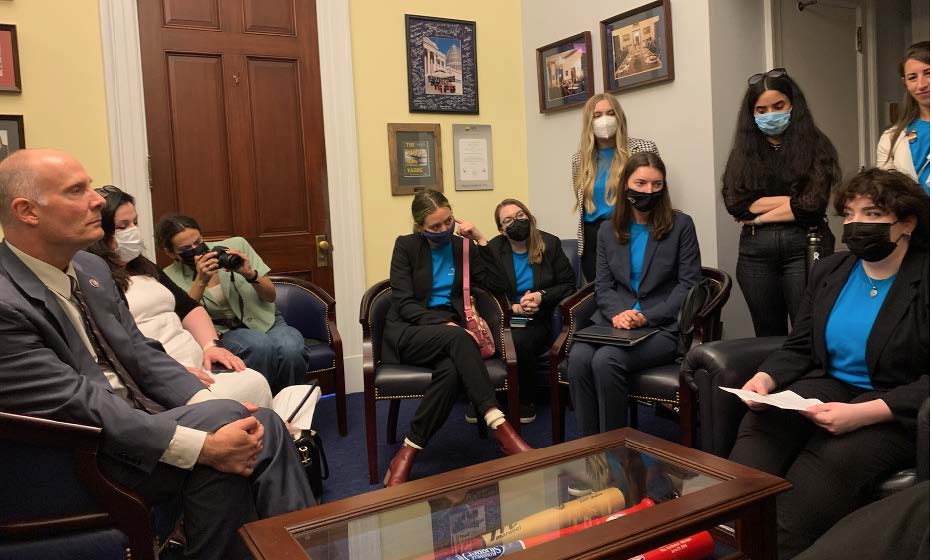
SciPol-Detroit tackles misinformation and shapes public policy
Biology students take science to the community
The emergence of COVID-19 coincided with a decline in the trust of policymakers and scientists. Disinformation and politicization of disease fed a credibility crisis and highlighted the need for scientists to re-establish trust within the community.
To address this, a group of Wayne State faculty and students came together around a simple question: how can we as scientists bring our knowledge to the public and policymakers to achieve change? The Science Policy Network-Detroit, (SciPol-Detroit) was born with the mission of bridging the gap between policymakers, scientists, and the public at large. This interdisciplinary coalition of students, faculty and community groups works by opening channels for communicating science.
The work of SciPol-Detroit is to unite, train and educate members to engage in policy discourse and civil advocacy. Members canvas Detroit communities, distribute literature on environmental and health hazards, provide information about resources and listen to residents' concerns. SciPol-Detroit partners with the Detroit Rotary Club, D-LEAD, a group of Detroit parents whose children have been affected by lead, and Detroit AirNet, working to provide air pollution monitors around Detroit.
My involvement in SciPol Detroit has helped me rethink what I want to accomplish as a scientist ... we have to advocate for changes that our science indicates could improve lives. — Brenna Friday
Data from these efforts supports policy briefs delivered to local and state-wide policymakers during office visits. Although science is an integral part of economic health and environmental policies, most politicians do not have a scientific background. SciPol-Detroit believes that it is up to us to use our knowledge and expertise to inform lawmakers. Members have made advocacy trips to Lansing and Washington D.C. to meet policymakers to communicate the importance of investing in health equity and research.
To prepare members to lobby legislators, SciPol-Detroit implements advocacy training workshops led by staff from the WSU Office of Government and Community Affairs. Communicating with the community is also important. SciPol-Detroit hosts panels with scientists, policymakers, and community leaders to discuss topics such as lead exposure and air pollution. Members also pen Detroit News Op-Ed articles, including one highlighting the widespread threat of residential lead contamination by Katie Dwyer, a biological sciences graduate student.
SciPol-Detroit is more than just the events they put on. It provides a space for people interested in science and policy to gather, share ideas and work collectively for a common purpose. The current executive board includes four Biological Sciences students: graduate students Katie Dwyer (President), Brenna Friday (Vice President), and Maggie Sneideman (Communications Director & Graduate Student Liaison) and undergraduate Emma Fidler (Membership Coordinator & Undergrad Student Liaison). Students have opportunities to network with interdisciplinary scientists, community leaders and legislators.
This work provides a unique perspective on scientific communication when findings have immediate societal implications. Ph.D. student Brenna Friday remarked “My involvement in SciPol-Detroit has helped me rethink what I want to accomplish as a scientist. These days, it doesn’t feel like enough to only share our findings in peer-reviewed publications; we have to go directly into communities and lawmakers’ offices to advocate for changes that our science indicates could improve lives.”

Science does not have to stay in the lab! You can campaign for your local elections, call your congressperson about a bill that you care about, and you can also get involved with SciPol-Detroit by joining or subscribing to its newsletter at the link below. SciPol-Detroit is an affiliate of the National Science Policy Network and is supported by the College of Liberal Arts and Sciences and the School of Medicine at Wayne State University, the American Association for the Advancement of Science (AAAS), Research!America and the Union for Concerned Scientists.
To subscribe to the SciPol-Detroit newsletter and learn about events register at go.wayne.edu/Sci-Pol-Info.
By Emma Fidler and Katherine Dwyer